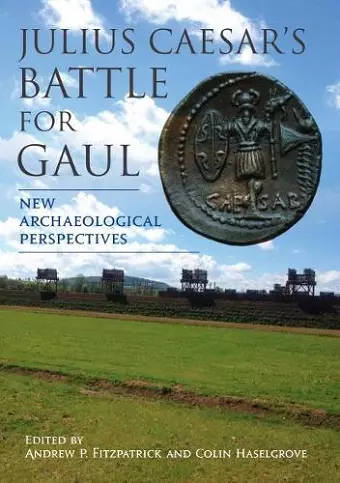Julius Caesar’s Battle for Gaul
New Archaeological Perspectives
Andrew P Fitzpatrick editor Colin Haselgrove editor
Format:Paperback
Publisher:Oxbow Books
Published:31st Aug '19
Should be back in stock very soon

Between 58 and 51 BC Julius Caesar conquered Gaul. He campaigned across much of present day France and the Low Countries, crossed the Rhine to Germany, and sailed the Channel to invade Britain. In doing this he achieved immense personal wealth and glory and the loyalty of a battle-hardened army of veterans. Caesar’s eventual return to Rome began with the crossing of the Rubicon which started a bloody civil war from which he emerged victorious and as dictator.
Roman historians have little to say on the consequences of the war on the Iron Age communities of north-west Europe. Their story is told instead by archaeology and numismatics. Huge numbers were involved in the war, at a vast cost in people and wealth. In the aftermath, leaders sympathetic to Rome were installed and sometimes whole peoples were resettled. The diplomatic relations created at this time directly affected the eventual incorporation of these peoples into the Roman Empire.
This book presents the latest archaeological research on the Battle for Gaul and its aftermath. Based on an acclaimed 2017 conference, it is the first Europe-wide overview and much of the research is published here in English for the first time. After an introduction to recent trends in historical studies, thematic studies and regional surveys analyse the archaeological and numismatic evidence from across north-west Europe. Comparative evidence for the Roman conquest of Spain is also examined, along with the fundamental role that the study of the Battle for Gaul played in shaping the development of Iron Age archaeology. Written by leading international experts, this book will be of interest to archaeologists, numismatists, ancient historians and military historians.
...an essential contribution to the dissemination of knowledge outside the circle of specialists, will undoubtedly become a reference work, by the timeliness and quality of the information provided, by its remarkable iconography (photos, diagrams, maps) perfectly coordinated with the text, and by the wealth of bibliographies that follow each chapter. * Ancient West & East *
Several important and timely theoretical considerations weave through the chapters, from reflections on the price of Roman imperialism paid by local communities and the global impact of Rome’s politics, to the challenges of discussing ethnicity and identity in the absence of the written record. * Britannia *
The conference proceedings impress with carefully researched and extremely important studies that provide insight into new excavations and investigations, and skilfully combine them with older research. * Bonner Jahrbücher *
But how much do you know about [Caesar's] campaigns in Gaul, his main battleground and the focus of his books? [...] This substantial book is here to help. It collects papers by archaeologists and historians from Britain, Spain, Germany, Switzerland, France, the Netherlands and the us, all in English, presented at a conference in Leicester in 2017. Together they bring up-todate perspectives on history and excavations. * British Archaeology *
The contributions gathered here combine syntheses and case studies, crossing the study of texts with archeology and numismatics, to offer a rich overview of recent developments in research on the Gallic Wars. * Bryn Mawr Classical Review *
ISBN: 9781789250503
Dimensions: unknown
Weight: unknown
336 pages